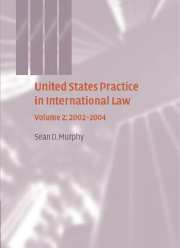Book contents
- Frontmatter
- Contents
- Foreword by Judge Stephen M. Schwebel
- Acknowledgments
- Table of Periodical Abbreviations
- Table of Cases
- Table of U.S. Statutes
- Table of Treaties
- I General International and U.S. Foreign Relations Law
- II State Diplomatic and Consular Relations
- III State Jurisdiction and Immunities
- IV State Responsibility and Liability
- V International Organizations
- VI International Oceans, Environment, Health, and Aviation Law
- VII International Economic Law
- VIII International Human Rights
- IX International Criminal Law
- X Use of Force and Arms Control
- XI Settlement of Disputes
- XII Private International Law
- Annex
- Index
V - International Organizations
Published online by Cambridge University Press: 10 December 2009
- Frontmatter
- Contents
- Foreword by Judge Stephen M. Schwebel
- Acknowledgments
- Table of Periodical Abbreviations
- Table of Cases
- Table of U.S. Statutes
- Table of Treaties
- I General International and U.S. Foreign Relations Law
- II State Diplomatic and Consular Relations
- III State Jurisdiction and Immunities
- IV State Responsibility and Liability
- V International Organizations
- VI International Oceans, Environment, Health, and Aviation Law
- VII International Economic Law
- VIII International Human Rights
- IX International Criminal Law
- X Use of Force and Arms Control
- XI Settlement of Disputes
- XII Private International Law
- Annex
- Index
Summary
OVERVIEW
During 2002–2004, the United States remained extensively involved in the work of international organizations as a means of cooperating within the multilateral system, while at the same time forging its own path on certain issues. Among other things, the United States pursued significant initiatives for: containing the spread of weapons of mass destruction, including through the interdiction of vessels on the high seas; banning human reproductive cloning; protecting against threats to the global environment and to public health, such as from the spread of persistent organic pollutants; and combating international crime, drug trafficking, and terrorism. The United States actively supported — with funds and in-kind resources — the work of the United Nations, particularly UN agencies seeking to protect those most at risk worldwide, such as the work of the UN Children's Fund, the UN High Commissioner for Refugees, and the World Food Program. The Bush administration viewed international economic institutions, notably the World Trade Organization and the UN Commission on International Trade Law, as a key means of promoting U.S. economic development. Further, the United States encouraged the use of multilateral bodies to set regulatory standards and arbitrate differences among countries in areas of food product safety, air safety, telecommunications, intellectual property, and others. During this period, the United States appeared before the International Court of Justice in two contentious cases (brought by Iran and Mexico), and filed a written statement in the Court's advisory opinion on the construction of a barrier in the West Bank by Israel.
- Type
- Chapter
- Information
- United States Practice in International Law , pp. 102 - 118Publisher: Cambridge University PressPrint publication year: 2006



